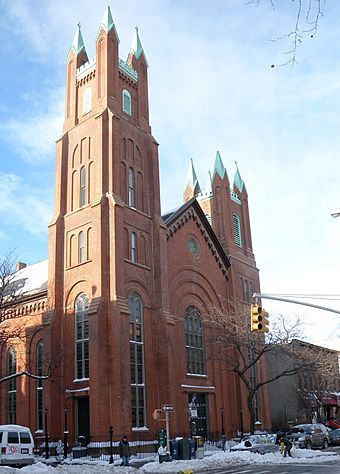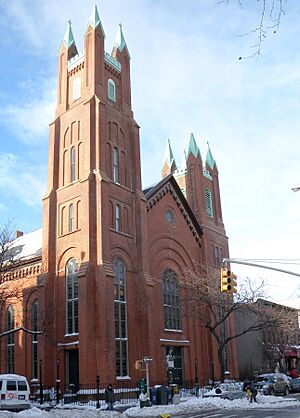South Congregational Church (Brooklyn) facts for kids
|
South Congregational Church (Former)
|
|

The former South Congregational Church of Brooklyn
|
|
| Location | President and Court Sts., Brooklyn, New York |
|---|---|
| Area | less than one acre |
| Built | 1851, 1857, 1889, 1893 |
| Architect | ?, ?, F.C. Merry, and Woodruff Leeming |
| Architectural style | Romanesque Revival architecture |
| NRHP reference No. | 82001183 |
Quick facts for kids Significant dates |
|
| Added to NRHP | November 4, 1982 |
The South Congregational Church is a special old building in Carroll Gardens, Brooklyn, New York City. It used to be a church for two different groups: the Congregational and United Church of Christ. Today, this building complex, which includes the church, a chapel, a ladies' parlor, and a rectory, has been turned into apartments and offices. It's considered an important landmark in New York City.
Contents
About the South Congregational Church
The South Congregational Church complex is located where Court and President Streets meet in Brooklyn. It was officially named a city landmark by the New York City Landmarks Preservation Commission on March 23, 1982. Later that same year, on November 4, 1982, it was added to the National Register of Historic Places. This means it's recognized as a very important historical place in the United States.
A Look at Its History
The very first part of the complex, the chapel, was built in 1851. The main church building followed a few years later in 1857. Over time, more parts were added. A "ladies' parlor" was built in 1889, and a rectory (a house for the church's leader) was added in 1893. The church building is famous for being one of the best examples of the Early Romanesque Revival style in Brooklyn. This style uses rounded arches and strong, solid shapes, similar to ancient Roman buildings.
Who Designed It?
While we know who designed some parts of the complex, the architects for the original chapel and church buildings are still a mystery! The ladies' parlor was designed by an English-American architect named Frederick Charles Merry. The rectory building was designed by another architect, Woodruff Leeming.
Famous Connections
It's believed that the famous preacher and abolitionist Henry Ward Beecher helped choose the location for this church. An abolitionist was someone who worked to end slavery. Henry Ward Beecher was also the brother of Harriet Beecher Stowe, who wrote the very famous book Uncle Tom's Cabin.
From Church to Homes
In the 1980s, the inside of the church complex was changed. Instead of being a church, it was turned into apartments and offices. This is an example of "adaptive reuse," which means taking an old building and giving it a new purpose while still keeping its historical look and feel.





